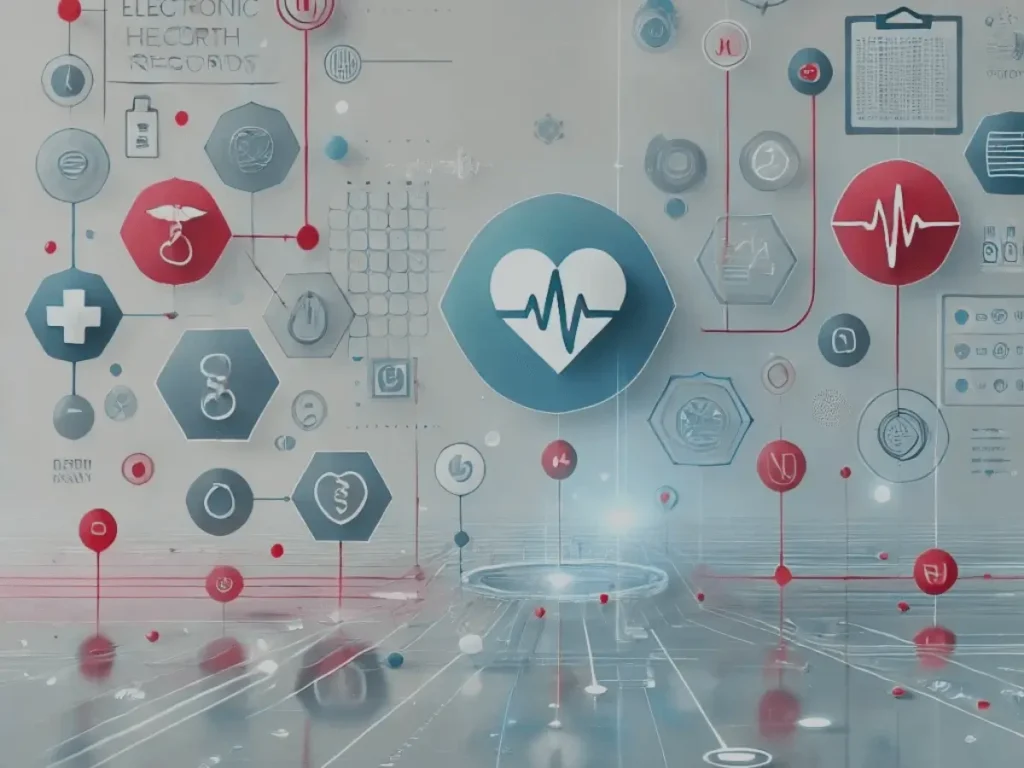There is a common misunderstanding that views EHRs and EMRs as one and the same. EHR and EMR are both acronyms that stand for electronic health record and electronic medical record respectively. We will get to know about the key difference between EHR vs EMR?
The electronic health record, however, contains much more information. While the EHR is considered as the source document itself and have benefits for providers and patients. However, it is interesting to note that the (EMR) came into existence first even though it is considered an adjunct to the (EHR), and electronically created once intended to be used in solo medical offices.
Unfortunately, the prevalence of the term “electronic health record” (EHR) was never the case due to the massive integration of healthcare systems and advancement in technology.
Key Takeaway
- Key difference between EHR vs EMR.
- To begin with, the EMR is simply limited to one location and is used solely to assist in the care of the patients present in that facility.
- EHR units are designed to be more comprehensive, inter-connected and responsive than the typical EHR arrangements to engage patients in several healthcare practices.
What is an electronic medical record (EMR)?
The term “Electronic Medical Records” (EMR) refers to the digital representation of the paper charts that were historically utilized. The patient’s past medical history, prescriptions, visit summaries, demographic information, insurance information, and other relevant details are all included in an electronic medical record.
Receive EHR Research Directly to Your Inbox
Covering the most important challenges that companies confront when adopting and deploying EHR systems.
The electronic medical record (EMR) is part of a medical practice and functions effectively for the procedures that take place within the practice. Nevertheless, computerized medical records are not easily transportable to locations outside of the practice. It is customary for the record to be printed off before the individual is allowed to leave the office. When the information needs to be shared with those outside of the practice, it is nearly as if you are utilizing paper charts.
What is an electronic health record (EHR)?
EHR systems enable users to securely capture, collect, and exchange information about the health of patients. They help to eliminate an overreliance on traditional paper-based records and help to enhance the healthcare services offered by providers.
What is the key difference between EMR vs EHR?
Among the questions that are asked the most frequently, “what is the difference between electronic medical records and electronic health records” is one of those that come very frequently.
As part of an electronic medical practice, an EMR is a storage facility for the digitized version of the patient’s medical chart held encapsulated within the practice. Every particle of relevant health information is documented in numerous databases which is what makes EHRs different.
This gives an integrated and comprehensive view of the entire health record of the patient with all his information in an instantly retrievable format.
Due to the fact that the electronic health record (EHR) makes it possible to communicate information in a secure manner, it is a useful instrument for coordinated care, particularly for patients who are receiving care from a number of different providers.
Do hospitals and office physicians use EMR or EHR?
Unlike EMRs, EHRs are mostly used in care facilities like hospitals.
The reason for this is that electronic health record systems enable the communication of information across various departments and sites of care, making them a better fit for the complexity and interconnectedness of care provided in hospitals.
In contrast, however, EMRs may still be used by single practice offices or smaller clinics for regionalized delivery of patient care.
If, for instance, a clinician inquires whether a patient should have a complete blood count done, that order is sent out to the relevant lab department, and it is electronically communicated. The laboratory conclusion for the laboratory workup will be performed. This information will be electronically inputted and sent to the physician in real time.
The physician has this information within a short period of time and makes a determination on the patient’s medical care.
When compared to EMR, why should you choose electronic health records?
| Aspects | EHR (Electronic Health Records) | EMR (Electronic Medical Records) |
| Definition | A comprehensive digital record of a patient’s health information that can shared across multiple healthcare providers. | A digital version of a patient’s medical chart used within a single healthcare practice. |
| Scope | Includes information from multiple sources such as clinics, labs, hospitals, and specialists. | Limited to the medical records within one specific practice or healthcare provider. |
| Accessibility | Accessible by authorized personnel across different healthcare settings, including the patient. | Accessible only by the medical practice that maintains the record. |
| Interoperability | Designed for secure sharing and integration of information across systems. | Not easily shared; often requires printing or manual transmission. |
| Coordination of Care | Facilitates coordinated care by enabling healthcare providers to view a unified patient history. | Focuses on maintaining patient records within a specific practice for individual care. |
| Patient Engagement | Often includes features that allow patients to view, manage, and share their health data. | Typically, does not provide access to patients. |
| Features | – Includes lab results, imaging, prescriptions, and patient history. | – Stores patient history, medications, and notes. |
| Use Case | Used in hospitals, multi-specialty clinics, and integrated healthcare systems. | Used in small practices or single-provider setups. |
| *** | **** | ***** |
Among the key difference between EHR vs EMR systems, the more important difference is that EHR systems promote the involvement of individuals in the course of their healthcare. Medical information and history can be easily accessible as well as keeping an open and constant communication with health provider. Health records can also control by the patient. There’s nothing for us to do but wait for this possibility to emerge because it should enable the population to be more health conscious and in turn lead to a more positive outcome in health management.
Conclusion
EHR systems, or Electronic Health Records, are crucial in healthcare for patient care. They integrate information from all aspects of patient care, allowing for flexible and shared information across practices and specialties. EHR systems offer a lot more benefits. Such as operational efficiency, patient care provision, analysis of findings, electronic prescribing, secure storage, and enhanced administrative operations. They also allow individuals to have a greater say in their healthcare management.
How AI Culture Empowers Your Practice with EHR Solutions
AI Culture is one of the companies to bring AI technology to the medical field. Now you can see how to expand your healthcare practice to the next level with us. We have worked for more than 4 years helping medical organizations. Here we are utilizing the power of the EHR systems to enhance their operational efficiency and patient care services.
Also, we have team of healthcare technologists who are aware with the problems. We provide encounter in different regions both in the United Kingdom and United States. We do not only create your practice EHR systems, but we also make sure they are easy to use.
Our Products and Services Include
- Automation of Administrative Tasks: paperwork for scheduling, billing, and prescriptions becomes a thing of the past.
- Decrease In Medical Errors: Doctors diagnoses and prescriptions are more effective due to the availability of patient data and decision support systems.
- Increase in Efficiency: according to research, 81% of professionals consider EHR systems to be very effective in increasing efficiency of work processes.
- Improved Revenue Cycle: features such as intelligent EHR systems help in enhancing workflows and reducing costs.
Take the next step and join the many healthcare providers who are enjoying the benefits brought by the EHR systems.








